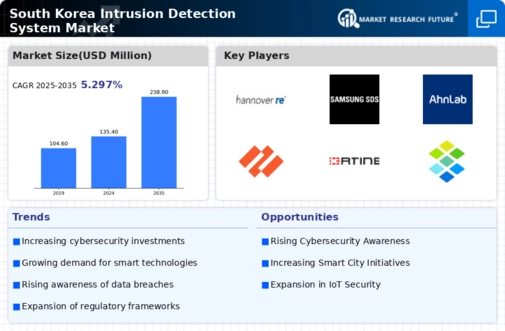Expansion of IoT Devices
The proliferation of Internet of Things (IoT) devices in South Korea is significantly impacting the intrusion detection-system market. As more devices become interconnected, the potential attack surface for cyber threats expands, necessitating enhanced security measures. It is estimated that by 2025, the number of IoT devices in South Korea could reach over 1 billion, creating a pressing need for effective intrusion detection systems to monitor and protect these devices. This growth in IoT adoption is likely to drive demand for specialized intrusion detection solutions that can address the unique challenges posed by these technologies, thereby fostering market expansion.
Rising Cybersecurity Threats
The intrusion detection-system market is experiencing growth due to the increasing frequency and sophistication of cyber threats in South Korea. Organizations are recognizing the need for robust security measures to protect sensitive data and critical infrastructure. In 2025, it is estimated that cybercrime could cost businesses globally over $10 trillion annually, prompting South Korean companies to invest heavily in intrusion detection systems. This heightened awareness of cybersecurity risks is driving demand for advanced detection solutions that can identify and mitigate threats in real-time, thereby enhancing overall security posture. As a result, the intrusion detection-system market is likely to expand as businesses seek to safeguard their assets against evolving cyber threats.
Growing Awareness of Data Privacy
The intrusion detection-system market is experiencing growth due to the increasing awareness of data privacy among consumers and businesses in South Korea. As data breaches become more prevalent, organizations are under pressure to protect sensitive information and maintain customer trust. This heightened awareness is prompting companies to invest in advanced intrusion detection systems that can provide real-time monitoring and threat detection. In 2025, it is anticipated that the market for data protection solutions will grow by 30%, reflecting the urgent need for effective security measures. Consequently, the intrusion detection-system market is likely to benefit from this trend as organizations prioritize data privacy and security.
Increased Regulatory Compliance Requirements
The intrusion detection-system market is influenced by the growing regulatory compliance requirements in South Korea. Organizations are mandated to adhere to various data protection laws and regulations, which necessitate the implementation of effective security measures. The Personal Information Protection Act (PIPA) and other regulations require businesses to ensure the confidentiality and integrity of personal data. As non-compliance can result in hefty fines, companies are increasingly investing in intrusion detection systems to meet these legal obligations. This trend is expected to drive market growth, as organizations prioritize compliance and risk management in their security strategies.
Technological Advancements in Security Solutions
The intrusion detection-system market is benefiting from rapid technological advancements in security solutions. Innovations such as machine learning and behavioral analytics are enhancing the capabilities of intrusion detection systems, allowing for more accurate threat detection and response. In South Korea, the adoption of these advanced technologies is projected to increase by 25% over the next few years, as organizations strive to stay ahead of potential threats. This trend indicates a shift towards more proactive security measures, where systems not only detect intrusions but also predict and prevent them. Consequently, the intrusion detection-system market is likely to see a surge in demand for these sophisticated solutions.
















